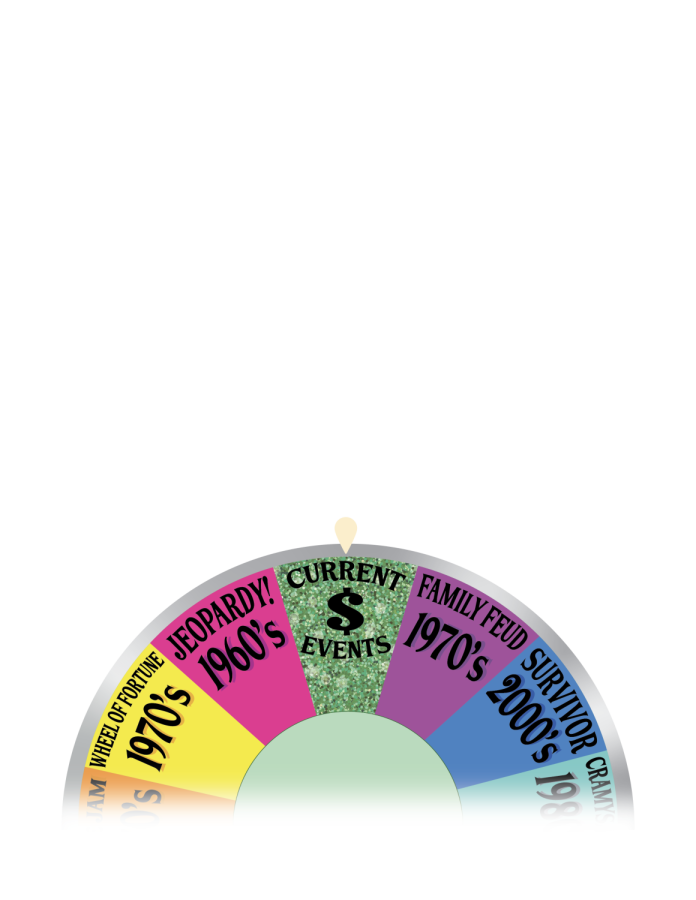From its humble radio beginnings to the cultural phenomenon it is now, the game show has become a staple within the cultural zeitgeist. Whether it’s “Who Wants to be a Millionaire”, “Jeopardy!”, “Family Feud” or “Wheel of Fortune” these shows have brought joy to people all over the world. However, when you look at the time periods in which these shows first appeared, an interesting pattern begins to emerge, as the shows reflect the attitudes of the eras in which they originated.
Jeopardy!
Since it started airing on March 30, 1964, “Jeopardy!” has been nonstop. The show averaged 9.2 million total viewers across its 2021-2022 season, and the continued relevance of Jeopardy is nothing short of incredible. The game involves contestants picking different questions of various difficulties. However, looking at the climate of the time it aired gives interesting insight as to what made this show resonate with viewers. In 1964, the U.S. was two years out of a recession, so a game show in which people simply had to answer trivia questions in order to gain desperately needed wealth resonated with many. According to Britannica the show has maintained ratings as one of the most popular shows in the country since its original airing.
Wheel of Fortune
Coming from the same mind behind “Jeopardy!”, Merv Griffin, “Wheel of Fortune” has aired continuously from its original airdate on January 6, 1975. Wheel of Fortune involves contestants both solving word puzzles, like many of the game shows at the time, while also spinning the titular wheel in order to see which prize they will earn. As previously discussed, the 1970’s were a time of major change in the U.S. In 1972, Congress passed the Equal Rights Amendment, which reads: “Equality of rights under the law shall not be denied or abridged by the United States or by any state on account of sex.”. “Wheel of Fortune” remains one of the few game shows that features a man and woman co-hosting, with Pat Sajak and Vanna White currently having the mantle. This was always present in the show with Susan Stafford being the original hostess of the show. A show in which a man and a woman co-hosted seemingly acted as a response to the call for more female representation in male-dominated spaces, such as television. According to the New York Post, Vanna White has now filled in as the main host for Pat Sajak on multiple occasions.
Family Feud
“Family Feud” has gone through multiple revisions over its lifespan, changing hosts from Richard Dawson to Ray Combs and eventually to Steve Harvey, who hosts the show today. The show first aired on July 12, 1976, with Richard Dawson as the host. The 1970’s gave rise to a large conservative movement, largely in response to the popularity of the hippie movement the decade prior. According to Britannica, this movement focused on many issues, but the idea of “traditional” roles and the value of the family unit was vital to many Americans. The concept of a game show in which a family works together in order to answer questions and earn money to share together was seemingly born out of these ideas.
Who Wants To Be A Millionaire
The British smash hit “Who Wants to be a Millionaire” is one of the most popular game shows of all time, spawning numerous spinoffs and being the driving element behind the 2008 film “Slumdog Millionaire”. The show first aired on September 4th, 1998 and featured the contestant answering increasingly difficult questions with the goal of earning the titular one million dollar cash prize. The show premiered for eight years after the resignation of Prime Minister Margaret Thatcher, however the U.K. was still very much under the influence of her pro-capitalist policies. The idea that if one were to work hard enough they could join the ranks of the upper class was widely-held at the time. This puts the concept of the show into new context as the entire premise of the show is that if the contestant were smart enough to answer the questions correctly, they would win the cash prize.
Survivor
Moving forward to today, “Survivor” has become a household name since its premiere on May 31, 2000. The show’s 2021 season maintained a 0.93 rating in the 18-49 demographic and 5.56 million viewers. “Survivor” involves the contestants living on an island and competing in various challenges in order to advance their “tribe”. The contestants must also choose who to vote off of the show, narrowing the pool of contestants each episode. The show differentiates itself from the rest discussed in a few key ways. The show showcases reality telvision elements, such as individual interviews with the contestants. “Survivor” is also serialized, meaning the game takes place over an entire season. The show features team dynamics similar to “Family Feud”, but ultimately still encourages individuality because only one contestant can win the show. The show ‘s emphasis on reality television elements and strong senses of individuality was influenced by well-performing reality shows such as “Keeping up with the Kardashians”.
The Game Show has provided entertainment for generations, and has, too, reflected the generations in which they were created. From the economic values of 1990’s Britain to the era of rapid change of the American 1970’s the game show has been ever-present, responding and adapting to the culture it’s a part of.





